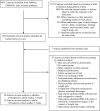Sugar-sweetened beverages and weight gain in children and adults: a systematic review and meta-analysis
- PMID: 23966427
- PMCID: PMC3778861
- DOI: 10.3945/ajcn.113.058362
Sugar-sweetened beverages and weight gain in children and adults: a systematic review and meta-analysis
Abstract
Background: The relation between sugar-sweetened beverages (SSBs) and body weight remains controversial.
Objective: We conducted a systematic review and meta-analysis to summarize the evidence in children and adults.
Design: We searched PubMed, EMBASE, and Cochrane databases through March 2013 for prospective cohort studies and randomized controlled trials (RCTs) that evaluated the SSB-weight relation. Separate meta-analyses were conducted in children and adults and for cohorts and RCTs by using random- and fixed-effects models.
Results: Thirty-two original articles were included in our meta-analyses: 20 in children (15 cohort studies, n = 25,745; 5 trials, n = 2772) and 12 in adults (7 cohort studies, n = 174,252; 5 trials, n = 292). In cohort studies, one daily serving increment of SSBs was associated with a 0.06 (95% CI: 0.02, 0.10) and 0.05 (95% CI: 0.03, 0.07)-unit increase in BMI in children and 0.22 kg (95% CI: 0.09, 0.34 kg) and 0.12 kg (95% CI: 0.10, 0.14 kg) weight gain in adults over 1 y in random- and fixed-effects models, respectively. RCTs in children showed reductions in BMI gain when SSBs were reduced [random and fixed effects: -0.17 (95% CI: -0.39, 0.05) and -0.12 (95% CI: -0.22, -0.2)], whereas RCTs in adults showed increases in body weight when SSBs were added (random and fixed effects: 0.85 kg; 95% CI: 0.50, 1.20 kg). Sensitivity analyses of RCTs in children showed more pronounced benefits in preventing weight gain in SSB substitution trials (compared with school-based educational programs) and among overweight children (compared with normal-weight children).
Conclusion: Our systematic review and meta-analysis of prospective cohort studies and RCTs provides evidence that SSB consumption promotes weight gain in children and adults.
Figures






Comment in
-
JPEN Journal Club 27: Vested Interests.JPEN J Parenter Enteral Nutr. 2017 May;41(4):691-693. doi: 10.1177/0148607117696329. JPEN J Parenter Enteral Nutr. 2017. PMID: 28445680 No abstract available.
References
-
- Yngve A, Haapala I, Hodge A, McNeill G, Tseng M. Making soft drinks the dietary version of the cigarette. Public Health Nutr 2012;15:1329–30 - PubMed
-
- Malik VS, Willett WC, Hu FB. Sugar-sweetened beverages and BMI in children and adolescents: reanalyses of a meta-analysis. Am J Clin Nutr 2009;89:438–9; author reply 9–40 - PubMed
Publication types
MeSH terms
Substances
Grants and funding
LinkOut - more resources
Full Text Sources
Other Literature Sources
Medical
Molecular Biology Databases

